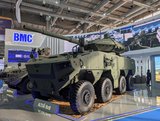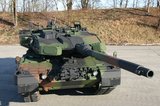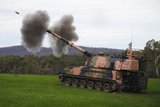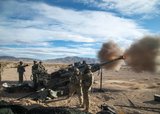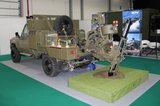New Supacat vehicles add off-road recovery capability for British Army
The 6x6 Coyote LWRV can be converted from a 4x4 Jackal 2 by adding an extra axle unit and a dedicated recovery module. (Photo: Supacat/NP Aerospace)
NP Aerospace, engineering authority for the UK MoD protected mobility fleet, and Supacat, are progressing development of new Lightweight Recovery Vehicles (LWRVs) for the British Army.
Four Supacat LWRV vehicles are due to be released to the service in Spring 2023, meeting a requirement for off-road recovery capability in environments such as those seen in Mali during Operation Newcombe.
The development falls under the MoD's Protected Mobility Engineering & Technical Support (PMETS) contract led by NP Aerospace and contracted vehicle OEMs and partners.
The LWRV utilises four in-service Jackal 2 vehicles with the addition of Supacat’s Extenda removable third axle to provide the recovery module and configure the 4x4 Jackal 2 as a 6x6 Coyote.
The design solution also incorporates Supacat’s Supalift system that will allow the recovery of Foxhound and HMT platforms.
The modular design allows LWRVs to switch between Jackal 2 and Coyote configuration by respective removal or addition of the recovery module.
David Petheram, COO, NP Aerospace, said: 'The project has received great feedback and we look forward to delivering the capability over the coming weeks.'
More from Land Warfare
-
![US Army plans Q2 prototype proposal request for its Mobile Tactical Cannon programme]()
US Army plans Q2 prototype proposal request for its Mobile Tactical Cannon programme
The US Army is seeking a mature 155mm, wheeled, self-propelled capability to replace the towed M777 howitzer in the Stryker, Mobile and Infantry Brigade Combat Teams as it targets a potential 498-unit acquisition goal.
-
![British Army’s Project Stokes 120mm mortar bids due in March 2026]()
British Army’s Project Stokes 120mm mortar bids due in March 2026
Project Stokes could see a new 120mm mortar capability enter British service, with domestic production and international partnerships central to competing bids.
-
![MKJ Warrior Series — The Nett Warrior Qualified Connector for Today’s Soldier Systems]()
MKJ Warrior Series — The Nett Warrior Qualified Connector for Today’s Soldier Systems
ITT Cannon’s MKJ Warrior connectors are designed for the harshest environments, delivering mission critical comms, navigation and USB data/power.









